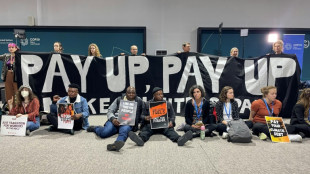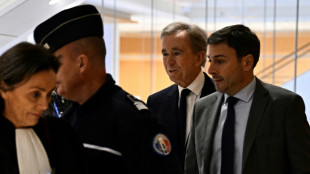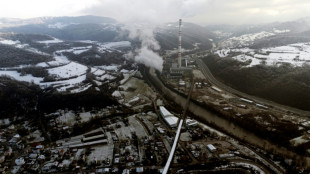
-
 'Nothing left': Flood-hit Spanish town struggles one month on
'Nothing left': Flood-hit Spanish town struggles one month on
-
Israel conducts first strike on Lebanon since ceasefire

-
 'Unrecognisable' Mbappe and Real Madrid hurting after European woes
'Unrecognisable' Mbappe and Real Madrid hurting after European woes
-
Uber and Bolt unveil women-only service in Paris

-
 French cognac workers protest China bottling plan amid tariff threat
French cognac workers protest China bottling plan amid tariff threat
-
World tennis No.2 Swiatek accepts one-month doping suspension

-
 Suaalii to start for Wallabies against Ireland
Suaalii to start for Wallabies against Ireland
-
Farrell backs youngster Prendergast at fly-half for Aussie Test

-
 Suualii to start for Wallabies against Ireland
Suualii to start for Wallabies against Ireland
-
Camavinga joins Real Madrid injury list

-
 Australia passes landmark social media ban for under 16s
Australia passes landmark social media ban for under 16s
-
Nigerian president woos French investment on state visit

-
 Contentious COP29 deal casts doubt over climate plans
Contentious COP29 deal casts doubt over climate plans
-
PSG, Real Madrid toil as giants struggle to get to grips with new Champions League

-
 Lampard appointed manager of 'ambitious' Coventry
Lampard appointed manager of 'ambitious' Coventry
-
Liberian ex-warlord Prince Johnson dies aged 72

-
 K-pop band NewJeans leaves label over 'mistreatment'
K-pop band NewJeans leaves label over 'mistreatment'
-
Sri Lanka crash to record low Test total of 42 in South Africa

-
 Putin says barrage 'response' to West-supplied missiles
Putin says barrage 'response' to West-supplied missiles
-
Lebanon MPs seek end to leadership vacuum with January presidency vote

-
 Eurozone stocks lift as French political stand-off eases
Eurozone stocks lift as French political stand-off eases
-
French farmers wall off public buildings in protest over regulations

-
 France says ready for budget concessions to avert 'storm'
France says ready for budget concessions to avert 'storm'
-
Lampard appointed Coventry manager

-
 French luxury mogul Arnault defiant at ex-spy chief trial
French luxury mogul Arnault defiant at ex-spy chief trial
-
South Africa bowled out for 191 against Sri Lanka

-
 'Europe's best' Liverpool aim to pile pain on Man City
'Europe's best' Liverpool aim to pile pain on Man City
-
Hezbollah under pressure after war with Israel

-
 OPEC+ postpones meeting on oil output to December 5
OPEC+ postpones meeting on oil output to December 5
-
Zelensky slams Russia's 'despicable' use of cluster munitions in energy strikes

-
 One dead, thousands displaced as floods hit southern Thailand
One dead, thousands displaced as floods hit southern Thailand
-
Lebanon army deploys under Israel-Hezbollah ceasefire

-
 Imran Khan's wife Bushra Bibi emerges as Pakistan protest figure
Imran Khan's wife Bushra Bibi emerges as Pakistan protest figure
-
COP16 biodiversity talks to restart in February: UN

-
 Iran to hold nuclear talks with three European powers
Iran to hold nuclear talks with three European powers
-
French govt ready for budget concessions to avoid financial 'storm'

-
 Hong Kong airport third runway takes off
Hong Kong airport third runway takes off
-
In Bosnia, the path to renewables runs through its coal mines

-
 China probes top military official for corruption
China probes top military official for corruption
-
Syria war monitor says more than 130 dead in army-jihadist clashes

-
 China says top military official Miao Hua under investigation
China says top military official Miao Hua under investigation
-
Taiwan president's plan to stop over in Hawaii, Guam angers Beijing

-
 Russian attacks leave one million Ukrainians without power
Russian attacks leave one million Ukrainians without power
-
Markets mixed after subdued pre-holiday shift on Wall St

-
 What would an ICC arrest warrant for Myanmar's junta chief mean?
What would an ICC arrest warrant for Myanmar's junta chief mean?
-
China says top military official Miao Hua suspended, under investigation

-
 Taiwan's Lai to stop over in Hawaii, Guam during Pacific trip
Taiwan's Lai to stop over in Hawaii, Guam during Pacific trip
-
Namibia extends voting after logistical issues

-
 LIV Golf's Herbert in charge at Australian Open, Smith two back
LIV Golf's Herbert in charge at Australian Open, Smith two back
-
Despair in Sweden as gangs recruit kids as contract killers


Scientists call for more research into 'climate endgame'
The world must prepare for a "climate endgame" to better understand and plan for the potentially catastrophic impacts of global heating that governments have yet to consider, scientists warned Tuesday.
Climate models that can predict the extent of global warming depending on greenhouse gas emissions are increasingly sophisticated and provide policymakers with an accurate trajectory of global temperature rises.
What is less well explored is the cascading impact of certain events, such as crop failures and infrastructure loss due to extreme weather events, which are made likelier to occur with every degree of warming.
Researchers at the University of Cambridge and the Potsdam Institute for Climate Impact Research (PIK) outlined what is currently known about "catastrophic outcomes" and found gaping knowledge gaps.
Writing in the journal the Proceedings of the National Academy of Science, they proposed an international research agenda to help governments plan for "bad-to-worst cases".
These included four main areas of concern -- what the authors termed the "four horseman" of climate change: famine and malnutrition, extreme weather, conflict, and vector-borne diseases.
"Irreversible and potentially catastrophic risks caused by human induced climate change must be factored into our planning and actions," said Johan Rockstrom, PIK director and a study co-author.
He said that the more research is done on Earth's climate tipping points -- such as the irreversible melting of the ice caps or the Amazon rainforest turning from a carbon sink to source -- showed the ever-greater need to factor in high-risk scenarios into climate modelling.
"Key is to do the math of disaster, in order to avoid it," he said.
- 'Mismatched caution' -
The authors pointed out that successive UN climate science reports have mainly focused on the predicted effects of 1.5C-2C of warming and largely discounted the possibility of more excessive temperature rises.
Government plans put Earth on course to rise as much as 2.7C this century, a far cry from the 1.5-C cap envisaged in the 2015 Paris climate accord.
The study suggested that a scientific disposition to "err on the side of least drama" led to a lack of focus on potential impacts at 3C of warming or higher.
"This caution is understandable, yet it is mismatched to the risks and potential damages posed by climate change," it said.
In addition, risk assessments for so-called low-likelihood, high-impact events are notoriously difficult to accommodate in long-term climate modelling.
The researchers calculated areas of extreme heat -- with an annual average temperature of over 29C -- could cover two billion people by 2070.
They warned that temperatures posed a major risk of multiple "breadbasket failures" due to drought such as that gripping western Europe and heatwave such as the one that hit India's wheat harvest in March/April.
The team called for a special UN science report focusing on "catastrophic climate change scenarios" similar to its 2018 report on 1.5C of warming.
"We have to get serious about understanding the profound risks that come with moving our planet into unknown territory," said Joeri Rogelj, director of research at Imperial College London's Grantham Institute, who was not involved in the study.
"Researching these extreme cases means that we'll be able to better prepare, including by being more serious about reducing emissions now."
A.Gasser--BTB
